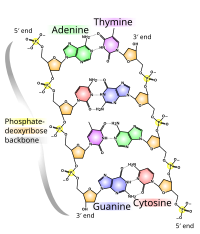
Back Самовъзпроизвеждане Bulgarian Replicació Catalan Autoreplikation German Autorreplicación Spanish خودهمتاسازی FA שכפול עצמי HE Replikasi diri ID Autoreplicazione Italian 自己複製 Japanese 자기 복제 Korean

Self-replication is any behavior of a dynamical system that yields construction of an identical or similar copy of itself. Biological cells, given suitable environments, reproduce by cell division. During cell division, DNA is replicated and can be transmitted to offspring during reproduction. Biological viruses can replicate, but only by commandeering the reproductive machinery of cells through a process of infection. Harmful prion proteins can replicate by converting normal proteins into rogue forms.[1] Computer viruses reproduce using the hardware and software already present on computers. Self-replication in robotics has been an area of research and a subject of interest in science fiction. Any self-replicating mechanism which does not make a perfect copy (mutation) will experience genetic variation and will create variants of itself. These variants will be subject to natural selection, since some will be better at surviving in their current environment than others and will out-breed them.
- ^ "'Lifeless' prion proteins are 'capable of evolution'". BBC News. 2010-01-01. Retrieved 2013-10-22.